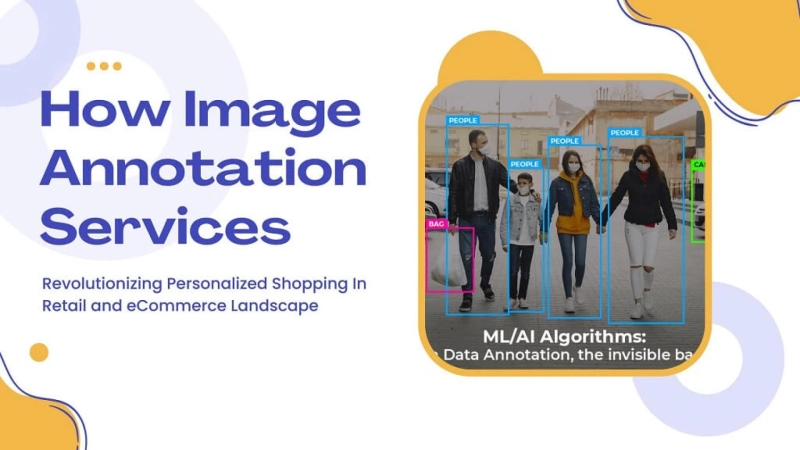Innovative technologies like AI and ML have creatively disrupted the retail and eCommerce landscape, revolutionizing the way we shop today. Coming far from static catalogs and basic research functions, customers look for seamless navigation through digital aisles, personalized interactions and strolls, and accurate product information at their fingertips. Thanks to AI/ML-based applications, finding and shopping things as per the taste and shopping behavior of customers whether online or in brick-and-mortar stores has become way easier, simpler, and quicker. Thus, businesses can easily acquire new customers while nurturing the existing ones, especially when the retail and eCommerce landscape is hypercompetitive-and standing out and delivering a seamless customer experience is paramount.
At the core of these revolutionary AI/ML-based applications streamlining the personalized shopping experience is the image annotation process. Acting as a bridge between human perception and machine learning models, it is the horsepower that fuels computer vision, deep learning, and various other algorithms to 'see' and 'understand' various things in their surroundings. At the same time, inaccurate annotations can lead to errors in the model's predictions and adversely affect its performance. Thus, data annotation services and specifically for images, are revolutionizing the eCommerce and retail landscape by empowering businesses to harness the full potential of innovative AI and ML applications and expand their paradigms.
By providing valuable, human-powered data that fuels AI models, these play a pivotal role in fueling returning patronage for the brands and elevating customer experiences. Other than this, retailers and eCommerce business owners can reap various transformative benefits, some of which are listed below:
1- Unlocking the Power of Personalized Shopping
Personalized recommendations play a key role in ensuring eCommerce success. Image annotation service providers tag and categorize product images with detailed attributes including color, size, style, and even occasion. This data enrichment allows retailers and eCommerce owners to leverage AI-powered recommendation engines to personalize their offerings and product suggestions for each customer, driving higher engagement and conversion rates.
How would you feel walking into a virtual store where recommendations pop up based on your unique preferences and past purchases? On the other hand, personalizing the shopping experience increases click-through rates and uplifts sales for businesses.
2- Revolutionizing Search and Discovery
Ever struggled to find that perfect outfit based on just a vague description? Gone are the days when customers would need to type detailed descriptions to get a particular product they were looking for- this guesswork is eliminated by visual search solutions, powered by image annotation. Customers can simply upload a picture of an item they like or point their cameras in physical stores, and AI algorithms, trained on meticulously annotated image datasets, identify similar products within the retailer's inventory.
This intuitive search method not only simplifies the shopping journey, especially for mobile users, but also increases customer satisfaction. Visual search engines are already benefitting businesses dealing in fashion and apparel, furniture, home dcor, etc. as customers can easily find what they're looking for.
3- Optimizing Operations and Inventory Management
Extending beyond customer-facing applications, image annotation helps the retail industry resolve stock-outs and overstocking issues. They can streamline operations and optimize inventory management through image recognition and classification. Image annotation companies meticulously tag product images with specific attributes like brand, category, and location within the warehouse.
This detailed data empowers AI models to predict demand accurately, optimize stock levels, and automate replenishment processes. One of the renowned grocery giants leverages image annotation to capture and analyze inventory data in real-time through in-store cameras, preventing lost sales, reducing stock-outs, and decreasing overstocking costs.
4- Fraud Detection and Prevention
Fraudulent activities are one of the persisting challenges for online marketplaces. AI models that can detect suspicious images can be used to combat this challenge. Experienced image annotators label images with specific attributes that might indicate fraud, such as fake logos, manipulated product appearances, or copyright infringement.
These AI-powered systems fed with multiple datasets then analyze new listings and flag potentially fraudulent activity before it impacts customers. This not only helps in decreasing fraudulent listings, but also fosters a safer shopping environment for users.
5- Transforming Customer Service
Businesses are leveraging the power of image annotation to offer innovative customer service solutions and transform their experiences. Suppose, a customer has trouble assembling a product. Image recognition technology trained on accurately labeled datasets can diagnose the problem via a picture of the issue, and offer visual instructions or connect them with a representative. This enhances customer satisfaction as well as reduces call center volume and costs.
6- Enhancing Product Information and Management
To build trust and reduce returns, providing accurate and detailed product information is vital. Professional image annotators can help e-tailers enrich their product pages with comprehensive data that goes beyond basic descriptions. They can capture size, color variations, material composition, and even usage scenarios, providing customers with a clear understanding of the product before purchase. This transparency not only results in higher customer satisfaction, but also reduces return rates.
All in all, image annotation is unlocking a new era of personalized shopping experiences, efficient inventory management, and enhanced product discoverability, and these are just a few examples. It offers even more benefits for the retail and eCommerce landscape-image quality assessment, powered by annotated data, ensures product listings showcase items in their best light. Automated price comparison, facilitated by image recognition, empowers customers to find the best deals across different retailers. Sentiment analysis based on annotated customer reviews helps businesses understand customer preferences and improve product offerings.
Bottom Line
Even though the image annotation revolution is in its early stages, it is poised to transform businesses across a diverse range of industries and verticals. holds immense potential. and along with its growing potential, the need for meticulously labeled datasets will grow as AI models become more sophisticated and data-hungry. That said, retail and eCommerce businesses can unlock a future of personalized experiences, intelligent inventory management, and a competitive edge in the ever-evolving digital marketplace by opting for image annotation outsourcing services.
Leveraging the power of human-powered data to train AI models, they can create a more engaging, efficient, and personalized shopping experience for their customers, ultimately driving success in the competitive digital age.


